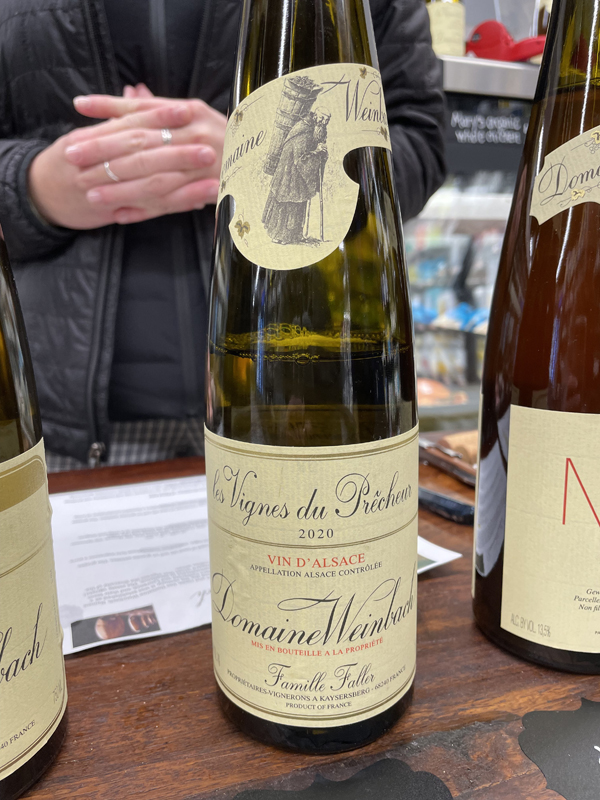2020 Domaine Weinbach, Les Vignes du Prêcheur, White Field Blend, Vin d’Alsace AOC, France.
The latest vintage Les Vignes du Prêcheur, which is single vineyard co-fermented white field blend of 5 native Alsatian grape varietals, with about 40% Riesling, 30% Auxerrois, 20% Pinot Gris, 5% Muscat and 5% Sylvaner continues to really impress me after first tasting the 2019 last year, with this year’s being even more complex and expressive. This particular vineyard, as mentioned, is known as the Preacher’s Vineyard, hence the name, has mixed grape make up and sits just below the famous Grand Cru Kaefferkopf site that is set on sandy and clay based soils, which makes for expressive and ripe fruit. Like last year, you’ll find the Les Vignes du Prêcheur, with its fine floral and mineral aromatics, shows spiced jasmine flowers along with wet stones, peach on its crisp dry medium bodied palate that adds green apple, almonds, quince, spearmint, chalk and subtle tropical essences. Not as chiseled as the single varietal wines in the Weinbach lineup or as full bodied as the cru offerings, this wine fits nicely in the collection and allows for wonderful early and easy drinking, but with the grace and complexity you’d expect from this fabulous label. Field blends are still more of a rarity in Alsace, but were popular in ancient times, and while Weinbach is new to them there are some amazing versions, as I have noted before, like Marcel Deiss’ Grand Cru bottlings and Marc Tempe’s wines to name a few. Respected for their traditional wines, especially the Rieslings, Weinbach has surprised many with a new “Orange Wine” made from skin contact Gewürztraminer and Pinot Gris, which is very interesting as well.
The Les Vignes du Prêcheur vineyard, which is In the process of certification and has been converted to all organic and biodynamic farming methods, and they get a short pruning of the vines to keep yields low, to promote concentration and allow for aromatic intensity. To make this wine, Weinbach uses a gentle whole cluster pressing of the grapes in a soft pneumatic press, with the fermentation being done exclusively with indigenous yeasts and the aging done in large neutral oak casks. The Les Vignes du Prêcheur got an elevage on the lees of close to 8 months before bottling without fining, as Weinbach is all vegan, it saw just a light filtration for clarity and stabilization. Tasted with some other 2020s, this wine was a stand out for the quality and value, along with Weinbach’s Clos des Capucins Pinot Gris, which itself is a killer bottles, delivering Riesling like vigor and depth, it is a wine that I will given full notes on soon. The Domaine Weinbach, one of Alsace’s great estates, and a favorite of mine, was originally founded by the Order of Capuchin monks back in 1612, property was a walled in and a totally self contained site making some of the best wine in the region for the better part of a hundred years. The “Clos des Capuchins” is the vineyard that surrounds the domaine, it sits directly below the prestigious Schlossberg Cru (the first terroir in Alsace to receive the status of Grand Cru), along with the Grand Cru Furstentum (known for Gewürztraminer and as well as to the adjacent Altenbourg Cru (known for Pinot Gris) vineyard that rises above the Weinbach clos. The domaine is in the heart of Kayserberg’s hills and its valleys are some of the most picturesque places in Europe, and the wines here are, like this one, exceptionally well made and beautiful.
($30 Est.) 93 Points, grapelive
